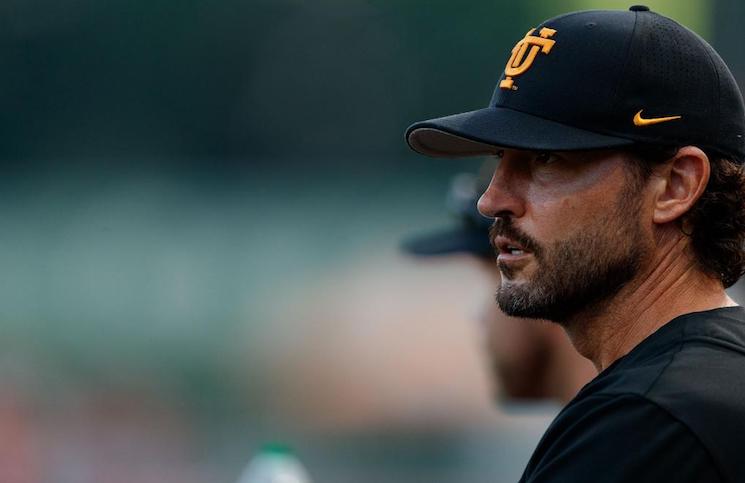
This Week in UT Sports History is a weekly column written by RTI columnist Lexie Little
History repeated itself. The Tennessee Volunteers (1-2) earned their first win of the season against UT-Chattanooga (1-2) on Saturday in Neyland Stadium, shutting out the Mocs, 45-0. Tennessee improved to 39-2-2 against its fellow university system competitor, winning their 10th consecutive match-up to extend a history of success against in-state foes.
On Oct. 10, 1953, the Tennessee Volunteers earned their first win of the season by defeating UTC 40-7. That Vol squad had also started the season 0-2 with losses to Mississippi State and Duke. And who played on that squad? A halfback named Johnny Majors, who Tennessee faithful celebrate in “This Week in UT Sports History.”
Sept. 17, 1977
A Tennessee Vol returned home to take over as head coach during the 1977 season. Johnny Majors, who finished runner-up to Paul Hornung for the 1956 Heisman trophy, played for Tennessee from 1953 until 1956 prior to his career as a coach. He stayed with the Volunteers as a graduate assistant in 1957 and took charge of the backfield from 1958-59 until leaving for Mississippi State. He then went to coach at Arkansas before heading to Iowa State (1968-72) and Pittsburgh (1936-76) where he served as head coach. His 1976 Pittsburgh team won the national championship at the Sugar Bowl to finish a perfect 12-0 season.
Pittsburgh may have been perfect, but it wasn’t home.
Majors earned his first win as head coach of the Vols on Sept. 17, 1977, beating Boston College 24-18 in Neyland Stadium. His defense came out roaring just as loud as his prior Pittsburgh Panthers, forcing four fumbles and snagging four interceptions. The number four seemed to be a trend, as that win marked one of only four that fans would see that season; 83,263 witnessed the win No. 1 in Knoxville that day.
Majors started his Tennessee tenure 4-9-1 through his first 14 games, mirroring current head coach Jeremy Pruitt’s 5-9 initial record and marking another connection between Majors’ career and the current climate.
“The first year we were 4-7, 5-5-1 the second year, but the third year we were 7-5,” Majors said in an interview for Vols Wire. “We then started building an outstanding program and was here 16 years.”
The Majors era might have started with a losing record, but he coached winners who bred more winners. Punter Craig Colquitt played on the ’77 team that defeated Boston College. The next two years, he earned the title of Super Bowl champion with the Pittsburgh Steelers who drafted him in the third round of the 1978 NFL Draft. Originally from Knoxville, Colquitt commenced a legacy of winners at Tennessee. His brother, Jimmy, also a Vol, served as the punter for the Seattle Seahawks in 1985. Colquitt’s sons, Dustin and Britton, followed the same UT tradition and became NFL punters.
In his book, “Tales from Behind the Steel Curtain: The Best Stories of the ’79 Steelers,” Steelers beat reporter Jim Wexell credits Majors with Colquitt’s success saying, “Colquitt was recommended to the Steelers by former Pitt and Tennessee coach Johnny Majors.”
Though Colquitt did not win a Southeastern Conference championship under Majors, the 1985, ’89, and ’90 squads took home the SEC title. Majors went on to earn an overall record of 185-137-10 before Phillip Fulmer took the helm in 1992.
Enter: Major(s) controversy.
In a town known for crazy coaching changes, Majors lost his position after losing games to 1-4 Arkansas, Alabama, and perennial post-bye foe South Carolina. Majors, who missed three games following quintuple bypass heart surgery, blamed “Judas Brutus” assistant coach (later head coach and current athletic director) Phillip Fulmer for the ousting.
Fulmer had led the Vols to three wins in Majors’ absence. Legend says Fulmer conspired with athletic director Doug Dickey and Tennessee Athletics member Bill Johnson to steal the position from the old ball coach. Fulmer, conspiracy or not, earned the position with continued wins culminating in a perfect season and national title six years later.
Majors harbors no ill-will for his alma mater.
“They’ve been great to me and my family for a long, long time since I went there as a freshman in 1953.” Majors said at a speaking engagement in Arkansas as reported by ESPN. “I am not a bitter man, I am not an angry man. I am having too much of a good time living.”
Now, Majors often return to Hallowed Hill, eating lunch at Copper Cellar on Cumberland Avenue before making his way to Neyland Stadium, a place he has frequented for more than 60 years.
And it all began 0-2 before a win against UT-Chattanooga.



